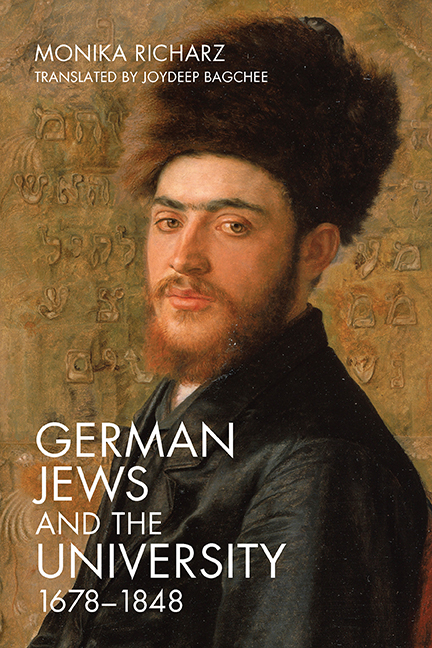Book contents
- Frontmatter
- Dedication
- Contents
- Foreword to the English Edition
- Foreword to the German Edition
- Preface to the German Edition
- Translator’s Note
- List of Abbreviations
- 1 Jewish Education in the Enlightenment Era
- 2 Jewish Encounters with the University before Emancipation
- 3 Jewish Students in the First Half of the Nineteenth Century
- 4 The Social Situation of Jewish Students in the pre-1848 Era
- 5 The Professional Experience of Jewish University Graduates
- Conclusion
- Documents
- Bibliography
- Index
2 - Jewish Encounters with the University before Emancipation
Published online by Cambridge University Press: 15 September 2022
- Frontmatter
- Dedication
- Contents
- Foreword to the English Edition
- Foreword to the German Edition
- Preface to the German Edition
- Translator’s Note
- List of Abbreviations
- 1 Jewish Education in the Enlightenment Era
- 2 Jewish Encounters with the University before Emancipation
- 3 Jewish Students in the First Half of the Nineteenth Century
- 4 The Social Situation of Jewish Students in the pre-1848 Era
- 5 The Professional Experience of Jewish University Graduates
- Conclusion
- Documents
- Bibliography
- Index
Summary
Merchants and Tutors in University Towns
GERMAN UNIVERSITIES OF the seventeenth century had a poor reputation and were not well regarded, particularly after the Thirty Years’ War, which had severely affected them. Given the Holy Roman Empire's territorial and denominational divisions, they were no more than small, poorly equipped state universities. Scholastic teaching dominated, professors were dependent on additional sources of income, and student life was characterized by fagging. The denominational orientation of intellectual life in the individual German states also shaped universities and was responsible for the religious intolerance and intellectual insularity of these institutions. Given that universities were strictly divided into Catholic, Protestant, and Reformed (Calvinist) institutions and professors and doctoral students had to affirm their allegiance to the respective denomination, the idea of matriculating Jews was unthinkable.
Yet, even before the admission of Jewish students to university, several points of contact between Jews and universities existed. Professors often exercised state supervision over Jewish religious and medical institutions, as well as over Hebrew printing offices. Theologians were tasked with censorship of Hebrew books and surveillance over Jewish prayers, because of the alleged danger of anti-Christian statements. In Brandenburg-Prussia, the Hebrew printing office of Moses Abraham Wulff was granted permission in 1707 to publish books in Halle on the condition that the local Faculty of Theology had the right to censor all publications in advance. When Wulff failed to comply, the faculty orchestrated his expulsion in 1740, on the grounds that, owing to his books, “the local university could acquire a bad reputation.” In 1709, the Faculty of Theology at the University of Frankfurt an der Oder was, likewise, tasked by the king with vetting all publications of the local Jewish printing press. In Brandenburg-Prussia, theologians had already subjected Jewish services to surveillance since 1703, after a Jewish convert denounced the Aleinu prayer as anti-Christian. As a result of this denunciation, parts of this prayer were banned. Even in 1778, the Königsberg synagogue featured an inspector's seat, which one of the theology professors occupied in return for special compensation.
As with its censorship of books, the university's supervision of medicine was not restricted to Jews alone. In most states, universities were responsible for issuing medical licenses to both Christian and Jewish doctors, conducting examinations for surgeons, and supervising barbers and midwives, as well as itinerant healers.
- Type
- Chapter
- Information
- German Jews and the University, 1678-1848 , pp. 16 - 89Publisher: Boydell & BrewerPrint publication year: 2022

